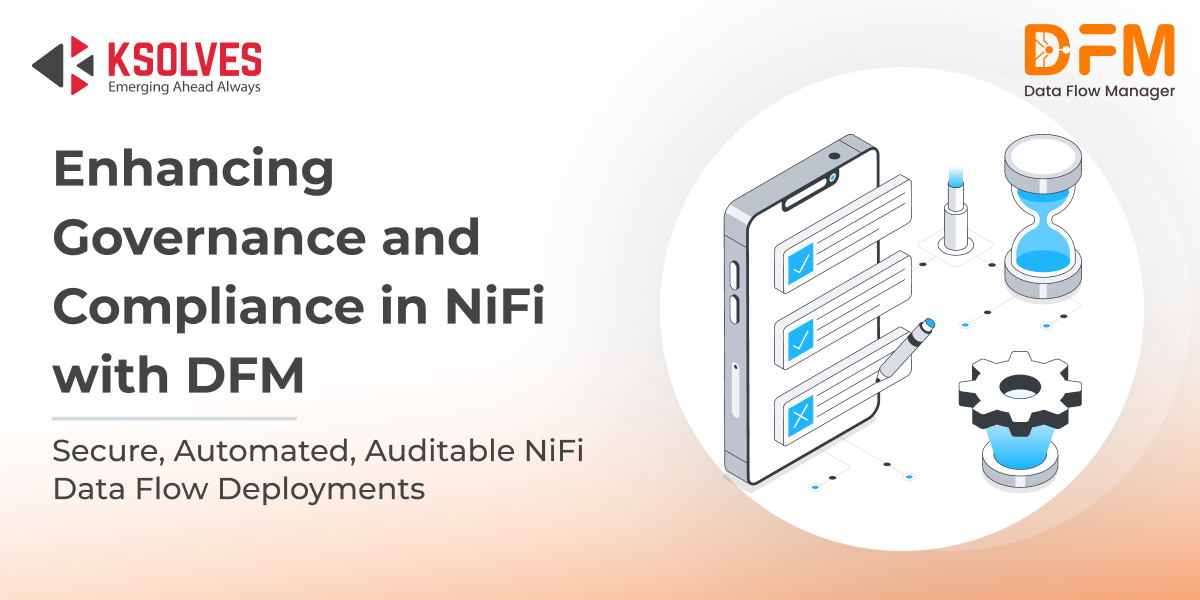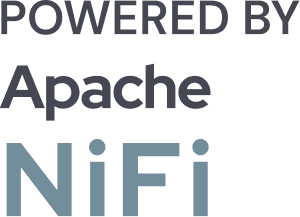Securing Apache NiFi Data Flows: Data Flow Manager’s Role in Enhancing Governance and Compliance
![]()

Businesses across industries are increasingly dependent on high-volume, real-time data. Apache NiFi has emerged as a leading platform for managing this data with its visual interface and powerful capabilities. However, as organizations scale and deal with sensitive data across multiple environments, security and compliance become non-negotiable.
This is where Data Flow Manager comes into play. It is an on-premise NiFi solution designed to simplify the deployment and creation of NiFi data flows and ensure full compliance with industry regulations through its game-changing features like role-based access control and version control. Together, NiFi and Data Flow Manager offer a robust framework for secure, auditable, and controlled NiFi data flow management.
The Compliance Challenge in Modern NiFi Data Flows
From GDPR in Europe to HIPAA in the healthcare sector and PCI DSS in financial services, today’s data regulations demand stringent control over data collection, movement, access, and retention.
Organizations must answer critical questions:
- Who has access to the data?
- Where does the data travel?
- What transformations occur along the way?
- Can every step be audited and traced?
These expectations go far beyond simple data encryption. They require end-to-end governance of data pipelines — and without the right tools, this becomes a daunting task.
Apache NiFi: Built-In Security That Sets the Foundation
Apache NiFi is designed with security at its core, offering a comprehensive set of features that meet many of the baseline requirements for enterprise data protection and regulatory compliance. Here’s how NiFi helps organizations safeguard their data flows:
1. Encrypted Communication
NiFi supports TLS/SSL encryption to secure all internal and external communications. This ensures that sensitive information, including credentials and payload data, remains protected during transit across networks.
2. Fine-Grained Authentication and Authorization
NiFi seamlessly integrates with enterprise identity providers like LDAP, Kerberos, and OpenID Connect. This enables user authentication and granular role-based access control, even at the level of individual processors, connections, and dataflows.
3. Data Provenance Tracking
NiFi automatically captures and maintains detailed provenance information for every flow file. This allows teams to trace the full lineage of data – what was done, when it happened, and who performed the action – a crucial capability for audits and forensic investigations.
4. Secure Parameterization and Property Encryption
With support for parameter contexts and encrypted sensitive properties, NiFi separates logic from credentials and other secrets. This reduces the risk of exposing API keys, passwords, and other confidential values within flow configurations.
The Hidden Compliance Risk in Apache NiFi
1. Manual NiFi Data Flow Deployments Prone to Human Error
Manually deploying NiFi data flows leaves room for human error at every step. A missed setting, a misconfigured processor, or an incorrect controller service can easily break a NiFi data flow or cause unexpected data handling.
These inconsistencies not only disrupt operations but also result in non-reproducible NiFi data flow deployments, making it nearly impossible to ensure consistent behavior across environments.
Compliance Impact: Manual, error-prone NiFi data flow deployments violate the principles of accountability and accuracy under frameworks like GDPR and HIPAA. Regulatory standards demand well-documented, repeatable processes that demonstrate control over data handling.
2. NiFi Data Flow Configuration Inconsistencies Across Environments
Different teams or departments may manage separate NiFi clusters, such as Development, Staging, and Production, each with unique configurations. Variations in parameter contexts, system properties, or controller services between clusters are common. As a result, NiFi data flows that work seamlessly in Development may silently fail in Production due to mismatched settings or configurations.
This inconsistency can lead to unpredictable behavior in production environments, causing data integrity issues, delays in processing, and potential system outages.
Compliance Impact: The lack of alignment and environment parity violates key best practices outlined in SOC 2 and ISO 27001, which emphasize repeatable, reliable processes for deployment and system integrity.
3. No Audit Trail for NiFi Data Flow Deployments
Without a centralized NiFi data flow deployment mechanism, tracking who deployed which data flow, when it was deployed, and what changes were made becomes a significant challenge. This lack of an audit trail leaves teams in the dark when trying to trace the source of issues, validate configurations, or address questions during security audits.
Without a reliable record of deployment actions, there is no way to verify that data flows were configured correctly or in compliance with organizational policies and regulatory requirements.
Compliance Impact: Regulatory frameworks like PCI DSS and HIPAA require complete change logs and NiFi data flow deployment histories; failure to provide them is a direct violation.
How Data Flow Manager Strengthens Governance and Ensures Compliance for Apache NiFi Data Flows
Data Flow Manager emerges as an essential companion to NiFi, purpose-built to close these gaps and harden compliance posture across the data pipeline lifecycle.
1. Automates NiFi Data Flow Deployment and Promotion
Data Flow Manager is a powerful tool for on-premise infrastructure to deploy and promote NiFi data flows across environments in minutes. This eliminates the need for the NiFi UI and controller services. You can effortlessly promote NiFi data flows from Development to Staging to Production without any manual effort, ensuring consistent configurations across environments.
Compliance Benefit: Enforces repeatability and accuracy required by SOC 2, ISO 27001, and GDPR, while eliminating NiFi data flow deployment inconsistencies that could compromise data integrity.
2. Enforces Role-Based Access Controls
Data Flow Manager’s granular role-based access controls ensure that only authorized personnel can deploy, modify, or promote NiFi data flows across environments. Integration with enterprise identity systems, like LDAP, SSO, and Kerberos, enhances security.
Compliance Benefit: Helps meet least privilege and segregation of duties requirements defined in compliance frameworks such as NIST, GDPR, and HIPAA.
3. Maintains a Complete Audit Trail for NiFi Data Flow Deployment
Every NiFi data flow deployment and promotion action – which NiFi data flow was deployed, by whom, when, and where – is logged and versioned. Data Flow Manager provides a centralized audit trail for all NiFi data flow deployment and promotion, making it easy to produce documentation for auditors and security teams.
Compliance Benefit: Satisfies the change log and traceability requirements of frameworks like HIPAA, PCI DSS, and SOX, enabling confident, audit-ready operations.
4. Built-In Version Control and Rollbacks
Data Flow Manager captures and stores every version of a NiFi data flow, allowing teams to roll back to any previous stable version if issues arise. No more guesswork or rebuilding broken pipelines manually.
Compliance Benefit: Aligns with SOX and ISO 27001 mandates for version management and operational resilience, helping prevent data loss and reduce downtime.
Conclusion
Apache NiFi provides the building blocks for scalable and secure data movement. But in industries where compliance is mission-critical, organizations need a governance layer that simplifies and strengthens how flows are managed, tested, and deployed.
With Data Flow Manager, your team can transform compliance from a roadblock into a streamlined, automated process — one that enables agility without compromising governance. Book your personalized demo!
![]()

